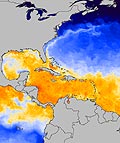This color-coded satellite image shows high sea surface temperatures — above 28 degrees Celsius (82 Fahrenheit) — are prevalent across the equatorial and tropical Atlantic Ocean as the 2010 hurricane season gets underway. Such warm temperatures, recorded by Japan’s Advanced Microwave Scanning Radiometer aboard NASA’s Aqua satellite, are a major reason why the U.S. government has forecast an “active to extremely active” Atlantic hurricane season this year. Hurricanes tend to form when sea surface temperatures rise above 28 Celsius, as indicated by the yellow and orange colors on the map. The U.S. National Oceanic and Atmospheric Administration (NOAA) last week projected a 70 percent probability this year for 14 to 23 named tropical storms, 8 to 14 hurricanes, and 3 to 7 major hurricanes. This year’s high sea surface temperatures in the Atlantic were recorded amid growing indications that global ocean temperatures are rising as the world warms. NOAA reported that last summer’s mean ocean surface temperatures were 62.5 degrees F, the warmest since record-keeping began in 1880 and 1 degree F above the 20th century average. An earlier study reported “significant warming” has occurred in the upper layer of the world’s oceans since 1993.
Warm Ocean Temperatures At Start of 2010 Atlantic Hurricane Season
More From E360
-
Climate
Lightning Strikes the Arctic: What Will It Mean for the Far North?
-
RIVERS
A Win for Farmers and Tribes Brings New Hope to the Klamath
-
Solutions
Deconstructing Buildings: The Quest for New Life for Old Wood
-
NATURAL DEFENSES
How Restored Wetlands Can Protect Europe from Russian Invasion
-
Solutions
Birds vs. Wind Turbines: New Research Aims to Prevent Deaths
-
FORESTS
Cambodian Forest Defenders at Risk for Exposing Illegal Logging
-
OPINION
The ‘Green’ Aviation Fuel That Would Increase Carbon Emissions
-
CONSERVATION
Out of the Wild: How A.I. Is Transforming Conservation Science
-
Energy
China’s Mega Dam Project Poses Big Risks for Asia’s Grand Canyon
-
Solutions
How Natural Solutions Can Help Islands Survive Sea Level Rise
-
INTERVIEW
Will U.S. Push on Seabed Mining End Global Consensus on Oceans?
-
Biodiversity
In Mexico’s ‘Avocado Belt,’ Villagers Stand Up to Protect Their Lands
